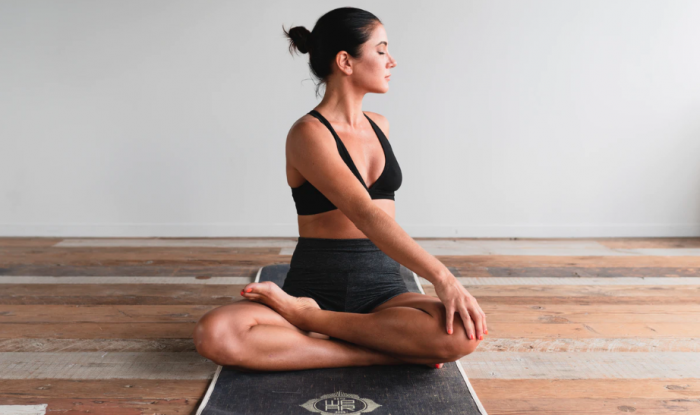As a survivor of both child abuse and domestic abuse who is recovering from PTSD, I know that exercise is essential to my healing process.
Lots of activity is supposed to keep me calm, centered, and in better shape. A recent study published in The Lancet has found that regular exercise makes people happier than money and even love.
I enjoy being active and take long walks in the mornings and evenings. I also love nothing more than swimming in the ocean. So, why was I so averse to a spin class, Pilates, core work, cardio, and CrossFit, to name just a few? And even more troubling, why was I suddenly making excuses to avoid yoga, something that had been a big part of my wellness plan for years?
A quick look at my lifestyle proved it wasn’t laziness. As an English professor, I’m trained to analyze and detect patterns in language, and when I started looking at the way the people around me talked about their workouts, from yoga to weight lifting to training for marathons, I noticed a disturbing trend that shed some light on my reluctance.
The way we talk about physical exercise is toxic.
“That class kicked my ass.”
“We slayed it.”
“The teacher destroyed me.”
“That class was brutal.”
“You guys are warriors.”
“Whew, she beat us up in there!”
I heard and read these words every day, in person and on social media posts, and the more I began to notice people using this kind of language, the more I realized that it was contributing to my own reluctance to exercise.
I too had even been guilty of speaking this way, and it was triggering me without my even realizing it. Looking back, it’s no shock that after a workout, I felt worse. My body ached and hurt all over.
I don’t want to fight any more battles, even metaphorical ones. War is scary and tragic. Exercise shouldn’t be framed in the language of conflict and suffering. My body isn’t my enemy, and it doesn’t need to be beaten into submission so it looks a certain way or bends to my will.
Thinking about physical fitness this way won’t help me heal at all. It will only deepen my wounds. For people with body image issues, speaking this way will only make those issues worse.
We’re trying to love ourselves and take care of our bodies when we workout, so it’s important to pay attention when it comes to self-talk and to speak about ourselves and the activities we choose to engage in with kindness and compassion.
When we refer to exercise in terms of violence, battle, and struggle, this language is upsetting to survivors of all kinds of real-life violence. Even if we haven’t been through this kind of trauma, these words can still be subconsciously unmotivating and create a lot of negative energy around fitness.
It’s worse for people with mental illness. The language becomes exclusionary and pushes away people who might really need exercise to heal. If physical activity truly can make us so happy, we need to choose our words about it more mindfully.
Let’s encourage, uplift, praise, and celebrate exercise, all in a spirit of joy and good times. I know what it’s like to be actually beat up, so I don’t want my “ass kicked” in a yoga class.
Inspired by the work of cognitive scientist Lera Boroditsky, who has found in her research that the language we use shapes our thoughts (and not the other way around as most people would expect), I have come to understand that the way we talk about exercise can have a huge impact on our mental and physical well-being, and I’ve really taken this to heart.
We may think that saying we’re “killing it” is empowering, but brutality, even in figurative language, can never be well-intentioned. In fact, this is one of the biggest problems in our society today—so many people, feeling weak and insecure, mistake violence for strength when it is anything but.
Let’s break the pattern.
We need a shift in awareness. When I changed the way I spoke to myself about fitness, and actively avoided teachers, classes, social media posts that framed physical activity in violent terms, I began to have a far more positive outlook on exercise and stopped avoiding it. Surprisingly, my body stopped experiencing exercise as literally painful, and I actually started to feel good, and strong!
Any kind of exercise can be fun and should be approached with a playful, enthusiastic spirit. Remember, sports are games. Most of the activities we engage in for exercise are recreational. Many forms of fitness involve gathering in groups of like-minded people, and this is a wonderful opportunity for connection where we can get fit and enjoy the company of others.
When I’m walking with friends or practicing yoga at my favorite studio, I take the chance to encourage and inspire others with positive words. Doing that makes me feel better too.
After a particularly exhilarating workout, instead of saying that we “killed it” or that it “kicked our ass” let’s describe that feeling by saying we are proud of ourselves, that we feel empowered, strong or invincible, or maybe even post that this session at the gym or our most recent hot yoga class was a great time with awesome people.
We can say we’re inspired, or invigorated and talk about how good it feels to move our bodies. But please, let’s leave the tired, negative clichés behind because we can do a lot better than that.
When we speak things aloud we make them real. The words we choose influence our thoughts and attitudes, and even our bodies. So let’s start paying attention to what we’re saying and posting when it comes to exercise and stay positive!
~
 Share on bsky
Share on bsky






Read 1 comment and reply